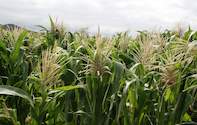
Currently South Africa grows three commercial crops that have been genetically modified, mainly for herbicide and insect tolerance. The three crops are maize, cotton and soya. However, Biowatch South Africa, an organisation interested in food security and biosafety in the country, reports that field trials have been carried out on genetically modified potatoes, wheat, canola, sugarcane, apple, eucalyptus, strawberry, sugar beet, tomato and sweet potato.
Biowatch estimate that in 2004, 35 percent of the maize grown in South Africa was genetically modified (GM), while 80 percent of the cotton grown was Bt cotton, which contains a gene obtained from bacteria that acts as a pesticide against insect larvae. Although South Africa imports more soya than it exports, about 30 percent of the soya available in the country is GM. The first South African legislation passed regarding the biotechnology industry is the Genetically Modified Organisms Act 15 of 1997.
Two years later regulations arising from the act were passed covering permits, risk assessment, trials, public notifications, accidents and waste management, amongst others. A national biotechnology strategy was also developed in 2001. In 2004 the department of health passed regulations making the labelling of foods containing genetically modified crops a voluntary exercise. The regulations also mean that a producer wishing to certify their foodstuff as being GM free have to ensure that their goods are not contaminated, and pay for testing and labelling.
This cost is then passed onto the consumer. Several issues have been raised relating to GM foods in South Africa and around the world. In South Africa, the high cost of GM seeds, which can be double that of ordinary seeds, means that GM plants are mostly grown by commercial farmers. Some GM crops have been grown by small-scale farmers, where the Land Bank provided a package of inputs and support. Genetically modified seeds can usually only be used for one season, and farmers cannot save seeds from their crop to use the next year.
While the commercial farmers save seeds less often than small-scale farmers, seed saving for all types of crops is common for small scale farmers. Soya farmers generally save seeds, and sign a contract with the seed companies that for every year that saved seed is used, a "technology fee" is paid to the seed company. As GM foods have been widely held up as a valuable for resource-poor farmers, these conditions may be somewhat restrictive to those on a subsistence budget.
The concern has also been that single seed companies may gain a monopoly over the seed supply market. If this happens, prices could be increased all the way up to the consumer because of increased seed prices. In South Africa, Monsanto, a wellknown supplier of GM seeds, has a large market share of the maize and wheat seed market. Other concerns relate to the pollution of natural varieties with the genes that have been introduced into GM crops. This could potentially make organic farming impossible in some areas.
Biowatch believes that insufficient studies into this matter have taken place in South Africa, and say "... in the light of patchy international evidence of benefits, South Africa should adopt a precautionary approach to genetically engineered crops rather than become a dumping ground and experimental field for crops not welcome in most other countries."
Internationally, GeneWatch and Greenpeace International launched an online register of the GM contamination incidents that have occurred around the world (www.gmcontaminationregister.org) on June 1, 2005. They record such things as the emergence of herbicide tolerant 'super weeds'. However, former Ugandan agriculture minister Wilberforce Kisamba-Mugerwa, now with the International Food Policy Research Institute, has said that GM crops are over-regulated and said that policy makers are in effect killing African children who die of malnutrition and hunger.
Learn more about Agriculture and Crop Farming in South Africa
By Melissa Wray Nationwide

